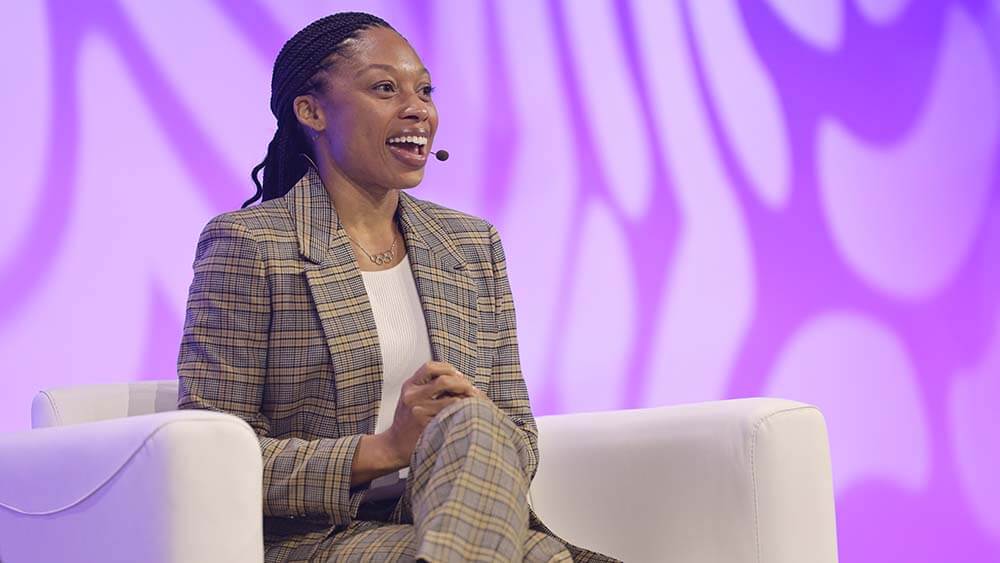
Olympic track-and-field medalist Allyson Felix chats with emcee Holly Ransom — and CL23 participants — on a wide range of topics Monday. (Whatever Media Group)
Allyson Felix, the most decorated American track-and-field athlete in Olympic history, put her everyday reality in perspective when she sat down to talk with emcee Holly Ransom on the Main Stage Monday morning. “To be an Olympic athlete — a lot of times we say we’re a little bit crazy, because for me, I have about 21 seconds to show the world what I’ve been working on for the past four years.”
In an exchange that often felt like a heart-to-heart talk between two friends, Felix touched on topics that ranged from how she learned to deal with failure, where she found the courage to take a stand against the sports establishment, and what’s more important to her than gold medals.
On earning her second silver medal in the Olympics
My first Olympics, I was 18 years old, and I had no expectations. The end result was a silver medal and as a teenager I didn’t understand. I was disappointed. But then, when I came back to the next Olympics, I was fired up that this was going to be a rematch. I’d been dedicating myself, working so hard … and I got another silver medal.
I was devastated. And that’s the moment that was really difficult and dark for me because I wasn’t sure if I still had it in me — if it was ever going come together. But now, looking back at that moment, I’m really grateful, because I believe it was a very defining moment in my career. It forced me to kind of look at every aspect of what I was doing: my training, my nutrition, my weight program, my management, just everything. And even if I could get 1 percent better in those areas, I needed to make changes to push myself.
When I did come back to that next Olympic game, four years later, I felt like I was prepared, and I was ready, and I knew that there was nothing left that I could still do. … and thankfully everything came together. But I don’t think I could have appreciated that moment of finally winning a gold medal had I not gone through those dark moments previously. They prepared me, they stretched me, they got me out of my comfort zone, and they allowed me to be ready to have a success later on.
On taking a public stand on her successful fight against the lack of pregnancy protection in her contracts, which set a precedent for female athletes everywhere
I’m a people pleaser; I don’t want to cause any problems, but I just had this moment where I was not going to let my [infant] daughter go through the same thing. I was so terrified. But my brother told me something when I was going through this. He said: “You can use your voice even if it shakes.” And I just held onto that because I was so scared, and I wasn’t sure if I could do it. But then on the other side of that, there was such a freedom and I heard from so many women, from so many families who had been through a similar experience and who could relate to what I had been through.
On how she manages the tension between short- and long-term goals
I think we all want to do work that has purpose. We all want to get to that end result and see that success, but don’t miss the journey along the way — the moments in between where you grow and where you stretch. For me, it was obsessing over that gold medal and thinking that that was going to be the end all and be all, when in reality it was the moments in between that were most meaningful to me.
Barbara Palmer is deputy editor of Convene.
